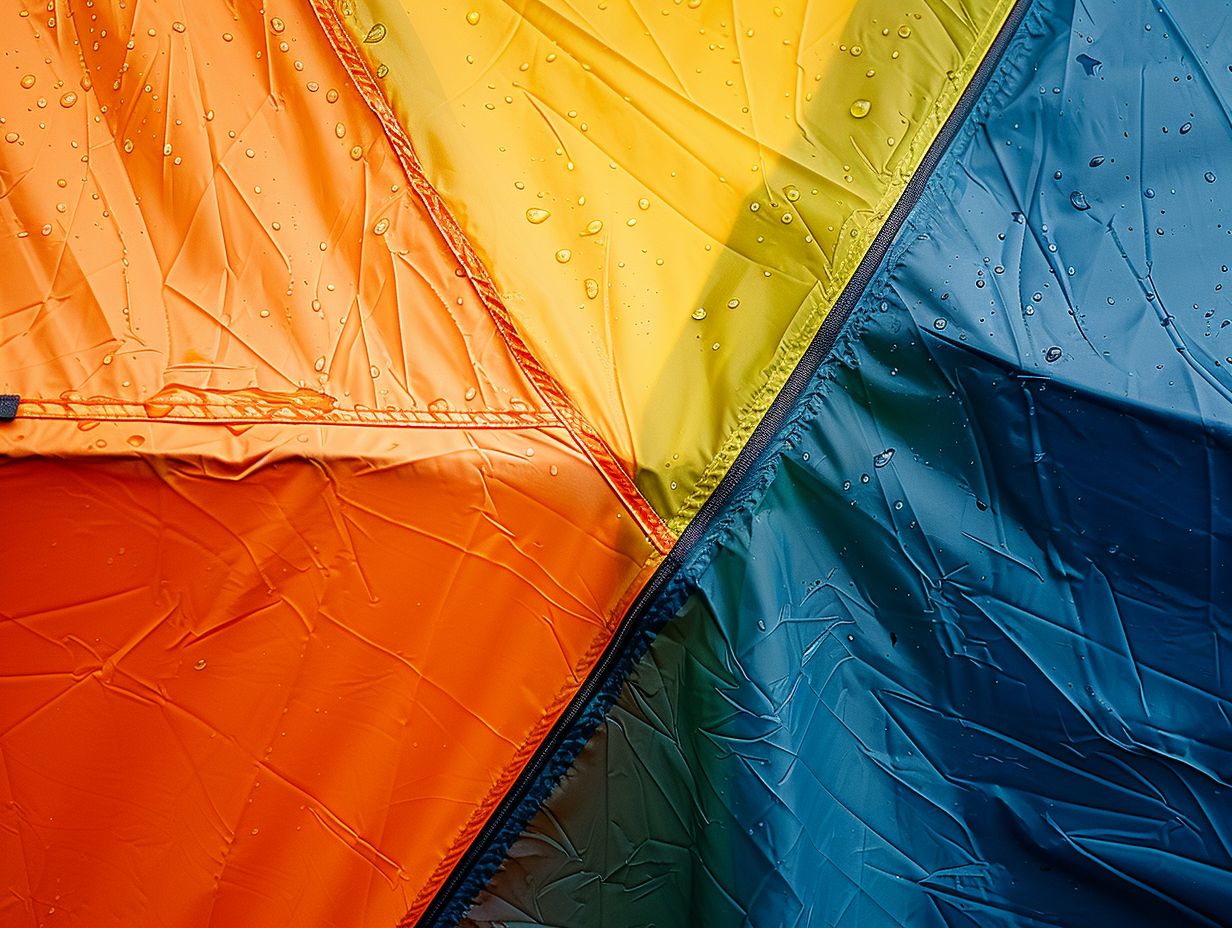I often work with nylon, a widely used synthetic polymer admired for its robustness and flexibility. I have delved into the realm of nylon’s ability to shield against harmful UV rays.
This exploration includes an examination of the characteristics of nylon that contribute to its effectiveness as a UV blocker, its interactions with UV light, distinctions among various types of nylon, and additional elements that may influence its UV protection capabilities.
I invite you to join me on this journey as we uncover the diverse applications of nylon in safeguarding against the sun’s rays.
Contents
What is Nylon?
.jpg_11.jpeg)
Nylon, a synthetic fabric material, is renowned in the clothing industry for its durability and lightweight characteristics.
Initially crafted by a group of scientists at DuPont during the 1930s, nylon swiftly garnered acclaim for its adaptable applications and robustness. Constructed from extended chains of polyamide molecules, nylon boasts exceptional resilience, making it a preferred choice for a wide array of purposes, spanning from clothing to industrial materials.
Its capacity to endure abrasion, high temperatures, and chemicals enhances its enduring standing in the textile sector. Additionally, its lightweight attributes contribute to its allure, providing a comfortable and pragmatic option for daily attire.
What are the Properties of Nylon?
Nylon is highly favored in the clothing industry due to its unique properties, combining lightweight construction with exceptional durability.
One of its key advantages is its impressive strength-to-weight ratio, enabling it to bear heavy loads without compromising on bulk. Additionally, nylon’s inherent flexibility allows it to adapt and conform to the body, resulting in comfortable and well-fitted garments. In terms of resilience, nylon stands out for its ability to withstand abrasion, making it a dependable choice for activewear and outdoor equipment.
These distinctive qualities of nylon position it as a versatile material that not only serves a practical function but also adds a touch of style to various applications within the realm of fashion.
Is Nylon a Good UV Blocker?
Nylon is a reliable UV blocker, offering protection against harmful rays and reducing the risk of sun damage. Its high-density composition makes it an effective shield against ultraviolet radiation, absorbing and dispersing the sun’s rays to prevent them from reaching the skin.

By creating a physical barrier between the skin and UV rays, nylon plays a crucial role in preventing sunburn, premature aging, and, in more severe cases, skin cancer.
This versatile fabric is commonly used in outdoor clothing and accessories, providing individuals with a dependable defense against the sun’s harmful effects while engaging in activities like hiking, swimming, or enjoying outdoor pursuits.
How Does Nylon Protect You from UV Light?
I utilize nylon for efficient protection against UV light as it acts as a barrier between my skin and harmful rays, ensuring sun safety whenever I engage in outdoor activities.
The protective capability of nylon stems from its tightly woven structure and synthetic makeup, which effectively obstructs the penetration of UV rays onto my skin. By serving as a shield, nylon aids in averting sunburn, premature aging, and skin damage resulting from extended exposure to sunlight.
Preserving skin health and decreasing the likelihood of UV-induced skin conditions like melanoma are pivotal reasons why integrating nylon-based clothing into my outdoor attire is crucial for comprehensive sun protection.
Does Nylon Absorb UV Rays?
Nylon, in fact, does absorb some UV rays; but it also serves as a protective shield by reflecting or scattering the harmful radiation away from the skin. This particular characteristic renders nylon an optimal choice for outdoor apparel and equipment, as it aids in diminishing the penetration of UV rays onto the skin.
Typically, the fabric technology incorporated in nylon garments includes UV protective coatings or treatments to bolster its effectiveness in shielding against the sun’s detrimental rays.
By adeptly obstructing or redirecting UV radiation, Nylon fabrics play a vital role in reducing the risk of sunburns, skin damage, and the enduring consequences of UV exposure. Consequently, this attribute offers reassurance to outdoor aficionados and individuals relishing sunny weather.
Does Nylon Reflect UV Rays?
Nylon possesses the capacity to deflect UV rays from the skin, thereby enhancing its UV protection factor and shielding against sunburn and skin injury. This reflective attribute of nylon plays a pivotal role in augmenting its protective functions against sun exposure.
By reflecting harmful UV rays, nylon assists in diminishing the radiation absorbed by the skin, consequently mitigating the likelihood of sunburn and potential long-term skin harm. This characteristic renders nylon a favored option for outdoor apparel, swimwear, and activewear, furnishing wearers with an additional level of protection against the detrimental impacts of the sun.
Does Nylon Scatter UV Rays?
.jpg_01.jpeg)
Nylon serves as a valuable shield against UV rays by scattering them, which helps reduce the risk of skin cancer and sun damage.
This material effectively blocks and reflects UV rays away from the skin, providing important protection against the harmful radiation emitted by the sun. This protective quality of nylon clothing is particularly crucial for individuals who spend extended periods outdoors or engage in activities exposed to direct sunlight.
The unique interaction between nylon fibers and UV rays demonstrates the material’s ability to create a barrier that limits the penetration of harmful radiation, offering significant skin protection. This characteristic has made nylon apparel a popular choice for individuals looking for dependable sun protection during various outdoor activities.
Are All Types of Nylon Equally Effective in Blocking UV Light?
Not all types of nylon provide the same level of UV protection due to differences in their composition and material technology.
Some variations of nylon are engineered with specific UV protection capabilities to guard against harmful sun exposure. For instance, certain nylon textiles undergo a manufacturing process where UV-blocking agents are integrated to amplify their capacity to shield the skin from ultraviolet radiation. These advanced Nylon fabrics deliver superior sun protection compared to conventional nylons, rendering them excellent options for outdoor pursuits in high solar intensity settings.
Being aware of the varying UV protection capabilities of different nylon fabrics give the power tos individuals to make well-informed choices when selecting attire for sun exposure.
What is the Difference Between Nylon 6 and Nylon 6,6?
Nylon 6 and Nylon 6,6 exhibit differences in their chemical composition and structure, influencing their properties and performance within the realm of fabric technology.
Nylon 6 is recognized for its flexibility and capacity to take on diverse shapes, owing to its uncomplicated structure characterized by repeating units of six carbon atoms. In contrast, Nylon 6,6 boasts a more intricate structure comprising alternating units of six carbon atoms and diamines, resulting in superior strength and durability.
These distinctions translate to Nylon 6 being lighter and more breathable, rendering it ideal for activewear and lightweight apparel. Conversely, Nylon 6,6 finds its niche in applications necessitating high tensile strength and resistance to wear, such as military gear and automotive components.
Which Type of Nylon is Better at Blocking UV Light?
Nylon 6,6 is often preferred for its superior UV-blocking capabilities, attributed to its dense weave and increased UV protection factor in comparison to Nylon 6.
The tightly woven structure of Nylon 6,6 fabric significantly contributes to its effectiveness in blocking UV rays. This tight arrangement serves to restrict the penetration of harmful UV rays through the fabric, thereby offering enhanced protection for the wearer. In contrast, Nylon 6, while still possessing UV protection properties, may not be as efficient in blocking UV radiation due to its looser weave configuration.
Advancements in fabric technology have elevated Nylon 6,6 as a top choice for outdoor clothing and accessories, particularly recognized for its heightened UV resistance capabilities.
What Other Factors Can Affect the UV Protection of Nylon?
Plus material type, factors such as color and thickness of nylon garments can significantly influence the level of UV protection they provide, ultimately impacting sun safety.
The color of a nylon garment plays a critical role in determining its UV protection efficacy. Darker colors like black or navy have a higher tendency to absorb UV radiation, offering superior shielding against harmful sun rays when compared to lighter pastel shades. Likewise, the thickness of the nylon fabric also affects its UV-blocking capabilities.
Thicker materials inherently provide greater resistance to UV penetration, thereby delivering enhanced sun protection. By taking into account both color and thickness when selecting nylon garments, individuals can optimize their skin protection during outdoor activities exposed to the sun.
Does the Color of Nylon Affect its UV Protection?
The level of UV protection provided by nylon can be influenced by its color, with darker hues offering superior defense against harmful rays in comparison to lighter shades.
- Dark colors such as black, navy, and dark green exhibit higher sun protection capabilities because they have the ability to absorb and block UV rays more efficiently.
- Conversely, lighter shades like white and pastels may offer reduced defense as they tend to reflect more sunlight.
Having a comprehension of how color impacts UV protection is essential in the apparel industry, especially when developing sun-safe clothing. Through the selection of appropriate colors, clothing manufacturers can elevate the UV protection provided by nylon garments, thereby ensuring enhanced sun safety for consumers.
Does the Thickness of Nylon Affect its UV Protection?
.jpg_10.jpeg) The level of protection against UV radiation can be influenced by the thickness of nylon textiles, as tighter weaves tend to offer better defense against harmful rays.
The level of protection against UV radiation can be influenced by the thickness of nylon textiles, as tighter weaves tend to offer better defense against harmful rays.
When considering ways to shield oneself from the damaging effects of the sun, it becomes imperative to take into account the weave density of nylon fabrics. Opting for fabrics with a denser weave structure can significantly enhance the protection from UV radiation.
The correlation between textile thickness and sun safety is crucial, as thicker nylon materials are known to provide improved shielding properties against harmful UV rays. This recognition underscores the importance of choosing textiles that combine both thickness and weave density to achieve optimal sun protection.
What are the Other Uses of Nylon for UV Protection?
Nylon offers a wide range of applications for UV protection, from protective clothing and umbrellas to innovative uses in sunscreen lotions.
It is intriguing to observe how nylon, with its exceptional UV-blocking properties, has been integrated into the formulation of sunscreen products. This versatile material acts as a barrier against harmful rays, providing an additional layer of protection when applied topically.
Designers have discovered inventive ways to incorporate nylon into umbrella designs, enhancing their capacity to shield individuals from the sun’s UV rays. The exploration of nylon for UV protection goes beyond traditional uses, presenting exciting opportunities for developing novel solutions in combating sun damage.
Is Nylon Used in Sunscreen?
I typically do not see nylon used in sunscreen formulations; however, it is commonly utilized in UV-protective clothing to enhance sun safety.
Nylon fabric has garnered recognition in the sun protection sector for its capacity to create a shield against harmful UV rays. Renowned for its resilience, nylon is effective in blocking out detrimental sunlight, making it a favorable option for outdoor activities exposed to the sun.
UV-protective clothing crafted from nylon is intended to provide not just physical protection but also comfort and style. This innovative application of nylon in sun-safe attire offers an additional layer of defense against skin damage, reducing the likelihood of sunburn and long-term sun-related health concerns.
Is Nylon Used in Clothing for UV Protection?
In the clothing industry, nylon stands out as a popular choice for UV protection, particularly in outdoor and performance wear intended to safeguard against harmful rays. Renowned for its durability and quick-drying attributes, nylon fabrics prove ideal for outdoor pursuits where sun safety holds paramount importance.
The dense weave and synthetic composition of nylon render it proficient at blocking UV rays, thus establishing a pivotal defense against sun-induced harm.
This adaptable material guarantees that UV-protective apparel remains lightweight and breathable, enabling individuals to stay comfortable and shielded across diverse outdoor environments. Nylon’s moisture-wicking capabilities effectively manage sweat, preserving dryness and enhancing the wearer’s comfort during outdoor endeavors.
Is Nylon Used in Umbrellas for UV Protection?
I utilize nylon in the design of UV-protective umbrellas to provide dependable sun protection in outdoor settings and enhance user safety. This versatile synthetic material is renowned for its lightweight and durable nature, as well as its excellent resistance to UV rays, making it an optimal choice for outdoor gear that requires protection from the sun’s harmful effects.
By integrating nylon into the construction of UV-protective umbrellas, manufacturers can offer consumers a stylish and efficient method to shield themselves from the sun while engaging in outdoor activities. The use of nylon in these umbrellas helps to ensure that individuals can enjoy comfort and safety under the sun, fostering awareness of sun safety and advocating for responsible sun exposure practices.
Frequently Asked Questions
Does nylon protect you from UV light?
Yes, nylon does provide some protection against UV light. However, the level of protection may vary depending on the type and quality of nylon fabric.
Can I rely on nylon clothing to protect myself from UV radiation?
While nylon fabric does offer some UV protection, it is not enough to rely solely on it for protection from harmful UV rays. It is recommended to use additional forms of sun protection, such as sunscreen and hats.
What factors affect the level of UV protection provided by nylon?
The thickness, color, and weave of the nylon fabric can all impact its level of UV protection. Generally, darker and thicker fabrics provide more protection compared to lighter and thinner ones.
Does the UPF rating of nylon make a difference in its UV protection?
Yes, the UPF (Ultraviolet Protection Factor) rating of nylon fabric is a good indicator of its level of UV protection. Nylon with a higher UPF rating offers more protection against UV rays.
Can I wash UV protection out of nylon fabric?
No, the UV protection of nylon fabric is not affected by washing. However, over time and with wear, the fabric may become more porous and offer less UV protection.
Are there any specific types of nylon that offer better UV protection?
Certain types of nylon, such as nylon with a tight weave or a coating of UV-resistant chemicals, can offer better protection against UV rays. It is best to check the label or product description for information on the UV protection of specific nylon fabrics.




